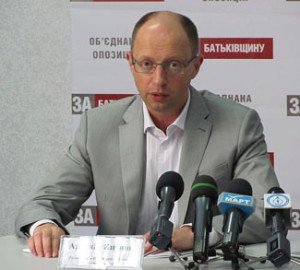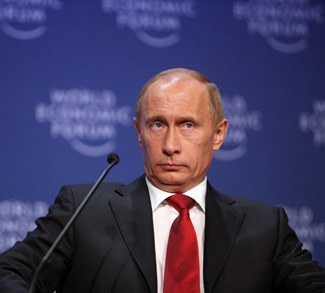The word “legitimate” is given three definitions by the Merriam-Webster dictionary, but it seems that none of them are known to those in the White House. Earlier this month President Obama declared that “any discussion about the future of Ukraine must include the legitimate government of Ukraine.” Illogically, he was referring to the new unelected leadership headed by acting prime minister Arseniy Yatsenyuk, who was subsequently welcomed to Washington by Obama to send a message that the United States “strongly supports… the legitimacy of the new Ukrainian government.”
While the Obama administration is correct in vigorously opposing Russia’s attempt to divide Ukraine, continually describing the latter’s new government as legitimate is a spurious and damaging pretense. Much of the media has made the same error. Western powers ignored Russia’s intimidation of former president Viktor Yanukovych and later supported a panicked power transition that bypassed democratic principles. In putting its official stamp of approval on these events, the United States looks all the more hypocritical as a promoter of global democracy.
Let’s put the current government in the context of the dictionary’s first definition of “legitimate”: allowed according to rules or laws. Yanukovych was overthrown in a single day on February 22. Earlier that morning he declared in a televised address that he had no intention of resigning from power. Regardless, with Yanukovych and many of his allies chased out of Kiev, a rushed emergency session vote was held under the specter of violence in which the majority of parliament agreed to depose the president.
The legality of the move is dubious. The Ukrainian constitution states that there are four circumstances in which a president may be removed between elections. The first three are moot in Yanukovych’s case as resignation, incapacitation, and death don’t apply. The fourth, impeachment, is what the new leadership uses as its justification for the president’s removal. Yanukovych’s alleged act of authorizing troops to fire at protesters would certainly be worthy of prosecution, but the parliament alone cannot administer impeachment. A committee investigation and judgment from the Constitutional Court must also be dispensed; neither of which occurred.
Even if the US government chooses to overlook the legal details – after all Yanukovych tried to tamper with the constitution for his own gain in 2010 – it doesn’t seem to adhere to the dictionary’s second explanation for “legitimate” either: fair or reasonable.
The day prior to his removal, Yanukovych signed into law constitutional changes that diluted his powers, formed a caretaker government, and allowed early presidential and parliamentary elections in May. While these concessions didn’t bring an immediate step towards resolving the catalyst issue of the EU trade agreement, it was a European-mediated deal expected to ease social unrest. But belligerent mobs of protesters continued to rout the city, effectively taking control of Kiev as police were forced into retreat. Yanukovych didn’t hang around and fled for Russia amid claims his car came under attack from gunfire, allowing the parliament to call the emergency session that resulted in the president’s removal. It was in nobody’s safety interest to oppose the motion.
The third definition for “legitimate” is: real, accepted, or official. As recent years have demonstrated, mass demonstrations can result in constructive political changes. But Ukraine is not experiencing an Arab Spring. Unlike the despotic regimes of Arab nations, Yanukovych was elected to power in 2010 under conditions deemed fair by international observers from the Organisation for Security and Co-operation in Europe (OSCE). Yanukovych won 49% of the vote versus 45.5% for the incumbent Yulia Tymoshenko.
The 2004 and 2010 elections illustrated Ukraine’s political divisions, with the east of the country supporting the traditionally pro-Russian Yanukovych, and most of the west voting for pro-Europe candidates. From afar it may have appeared like there was a mass uprising against Yanukovych in recent months, but Kiev’s geographical location in the West-leaning heartland magnified the negative sentiment against the president.
Yanukovych’s ascension to power was real, accepted, and official; adjectives that should not apply to the reigning US-supported government. Of course, a fair election does not give a leader free reign over a nation, but Yanukovych was not a Putin proxy. While depicted as a rigid puppet, last September Yanukovych forcefully vowed to his party at a private meeting that “we will pursue integration with Europe.” He was originally in favor the EU trade deal but those plans were spoiled by a combination of Russian trade threats and a $15 billion investment in fragile Ukrainian debt which lessened the attractiveness of Europe’s proposal.
Yet Yanukovych attempted to appeal to both sides of Ukraine by suggesting an arrangement involving trade deals with the EU and Russia. Such notions were quickly dismissed by European Commission President Jose Manuel Barroso who indicated that Ukraine must choose between the EU and Russia. “When we make a bilateral deal, we don’t need a trilateral agreement,” he said. Yanukovych didn’t sign and thus ensued anarchy in Kiev.
Yanukovych received no sign of US backing when Russia pressured him into rejecting the EU deal. The Obama administration only spoke out when it became embarrassingly clear that Russia felt it could do what it wanted with its neighbors. Putin’s boldness grew as the US government struggled with its own inertia.
Threatening Russia with sanctions, increasing NATO presence in the region, and facilitating aid through the IMF will help with Ukrainian security. But while the Obama administration believes that saluting the new government will encourage stability, in reality it is appeasing one mob and breeding contempt in another. The EU trade deal that spurred the unrest was not unanimously supported. A poll by German group GfK in November found that just 45% of Ukrainians supported the deal.
President Obama said he “supports Ukrainian democracy and self-determination,” while concurrently throwing his symbolic weight behind a government that came to power via blunt force. While it would be wrong for the US to condemn the current Ukrainian leadership, it should dial back its warmth in the public arena. At the moment the United States is trying to make a strong statement to Russia, but the message to Ukrainians is that storming a parliament counts as “legitimate” democracy.




